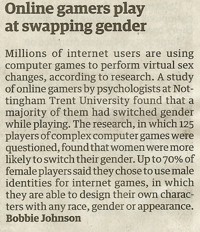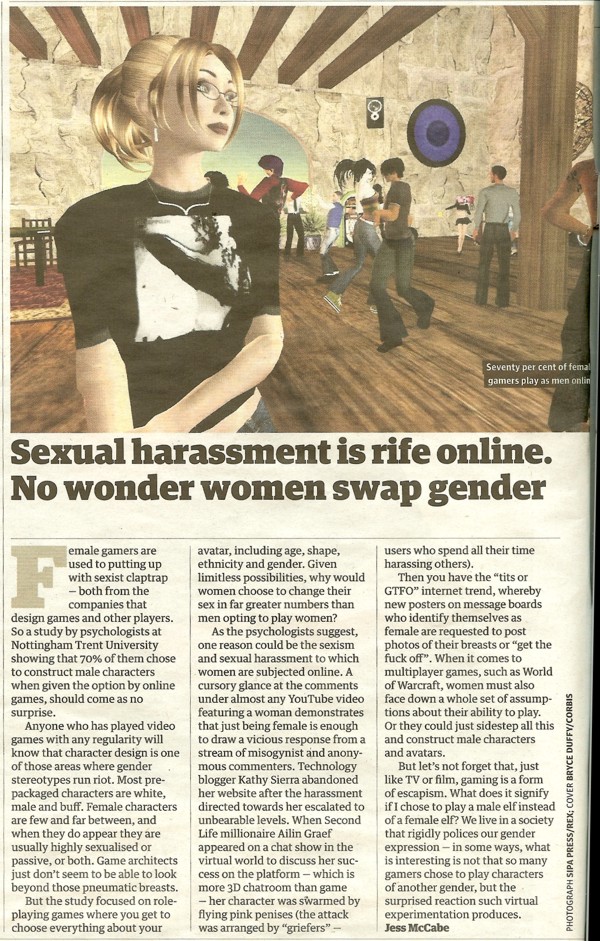
This is ... news?
Oh, it's news alright. The Press Association and Channel 4 made it that. It's just the kind of thing that editors like: a hint of sex, a hint of weird geekiness, a chance to show sympathy for women and an excuse to show hot babes from Second Life. Here's how the above story had developed for today's Guardian:

Now yesterday's article is actually correct in reporting the research results, in that it says the survey found that a majority of players had switched gender while playing (er, obviously not literally, but they had played a character of a gender not the same as their real one). This makes the context for the later assertion of "up to 70% of female players said they chose to use male identities for internet games" a little clearer. What the survey found was that up to 70% of the 32 female gamers they surveyed had played as a male persona in an online role-playing game at least once.
By today, this had turned into
All this has come about because of a paper by two researchers at Nottingham Trent University which someone decided was ground-breaking enough that it merited a press release.
Now I'm in a bit of a quandry here. On the one hand, I want more research on virtual worlds and don't want to discourage people from doing it, but on the other hand, this is just slapdash and slipshod. The authors seem to believe they have stumbled across an unresearched area, ripe for consideration; actually, it's a well-researched area, and their belief that it's virgin territory merely exposes their ignorance.
We've known everything they have to say about gender for decades. The first formal paper on it was Amy Bruckman's classic Gender Swapping on the Internet, published in 1993. Interest from gender study theorists really took off following Pavel Curtis's Mudding: Social Phenomena in Text-Based Virtual Realities. Both these papers include quotes eerily echoed in the responses listed in the Nottingham Trent paper some 15 years later. As a result of the interest that arose back then, we ended up not only with solid data about gender-swapping, but predictive theories. None of this even registered on the radar of the Nottingham Trent pair (who could have saved themselves a lot of time and effort by reading my book).
Now some of the problems are due to reporting, rather than research. The paper's authors do point out some of the problems with their survey themselves, which although enough to give academic cause for concern would not trouble journalists with a deadline to meet. These are: the survey respondents may not have told the truth; it's a small sample; the sample was self-selected; they only got their samples from four sources.
Announcing your flaws doesn't excuse them, though. For example, if you want to know how many people play online games with a gender other than their real one, you really should make some effort to verify what their real identity is instead of just asking. The survey sample is not just small, it's an order of magnitude smaller than some earlier surveys. The self-selection issue compromises the data in ways that earlier surveys studiously avoided. The four sources were forums that the majority of players simply don't read, one of which was womengamers.com (because it's so representative of women gamers) and another of which was Allakhazan (because its forums have such widespread appeal).
There are other flaws. Some of these are scholarly, such as not showing us their survey questions or the answers given, but others are factual. For example, while they are proudly telling us that women played longer per session than male players (198 minutes versus 186 minutes), Dmitri Williams — who is looking at terabytes of actual data from SOE — has discovered that women over-report the amount of time they spend in MMOs more than men do. When his MMO census work is published, it's going to become the standard data source for years to come, and it's almost guaranteed to show that actually, no, 70% of women don't play as male characters.
The reason I can say this, by the way, is that previous studies, from the rash of "summer paper" ones that came out in the 1990s to the authoritative ongoing surveys by people like Nick Yee, consistently show that about 40% of male players regularly play a female character and 5% of female players do. The female figure may in truth be higher, but it's much lower than the male figure. The reason for this, which was predicted by feminist theory, was because women regard their bodies as part of who they are to a greater extent than do men (ultimately, because they have periods and babies, but men don't). This means women are more reluctant to play as non-women then men are to play as non-men.
Where things get particularly fraught are with the reasons people give to explain why they play cross-gender. The thing is, what long-time researchers know but newcomers don't, is that the reasons people give are actually just cover to mask the real reasons they do it. The real reasons people play cross gender is basically because they can..! There are two ways to become yourself in a virtual world: one is to be you and to play your character just ahead of you, so you follow it if it reflects aspects of yourself that you like and pull it back if it doesn't; the other is to start at the opposite extreme to yourself and then move both you and character together so that they meet somewhere in the middle. The former will typically play as their own gender, and the latter will play as the opposite gender.
Now, this is all well and good, but if someone who doesn't really understand virtual worlds asks you why you're playing a character of the opposite gender, what can you reply? Most people don't consciously know why they're doing it; they do know it's not for sexuality reasons, though. What they need, therefore, is an answer that makes sense to someone who doesn't play the opposite gender. There are two answers to which, over the years, people have gravitated. The standard male response is: "if I'm going to look at an avatar's butt the whole time I play, I'd rather it was one I found attractive". This turns any covert slights against their sexuality on their heads: hey, look, I'm so masculine I play female characters! The standard female response, in contrast, is that they get hit on so often when playing as a female that they have to play as a male to escape it: hey, look, I'm so feminine I play male characters!
Neither of these excuses stands up to scrutiny, of course. A male player spends a good deal of his time looking at a horse's backside rather than his character's, and that figure of 40% of men playing female characters was the same back in the days of text MUDs when there were no avatars to ogle. A female player can simply tell anyone hitting on her that she's male in real life (enough men play as women for this to be the more likely scenario in most virtual worlds), or she can play a pig-ugly character like an orc. In any event, a woman can't hide her gender for long in today's VoIP environment (unless she chooses not to speak, and thereby misses out on much of the socialising).
So even the quotes reported, which underlie articles like the second one from The Guardian shown above, aren't quite what they seem.
This Nottingham Trent paper is very reminiscent of what we saw in the mid-1990s. People came to virtual worlds with an incomplete understanding of what they are, conducted some half-assed surveys, gave unsupported and occasionally damaging explanations, and then left. Their research was regarded as a joke by specialists, and ignored. I thought we were past all that now, but apparently not. This Nottingham Trent paper means well, but it's 15 years out of date. Nevertheless, news editors are happy to misinterpret its misunderstandings and comment on what really should have been left to its own, quiet backwater. I don't know who courted publicity on its behalf, but academically they've done more harm than good.
It's a little sad, really.